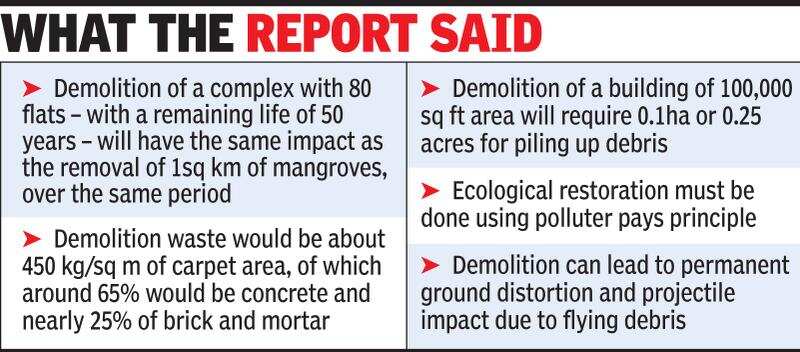
THIRUVANANTHAPURAM: Demolition of apartment complexes at Maradu would generate waste at a rate of 450kg/sq m and for a building with a built-up area of 1,00,000 sq ft, the demolition waste generated would be about 4500 tonnes. It would trigger pollution impact of various kinds within a radius of 1km, said an environment impact assessment (EIA) study by IIT-Madras.
It would require 0.25 acres to pile up the debris resulting from demolition of building (1,00,000 sq ft in area) and the debris would take up a layer measuring (approx) 3m high. The team cited implosion by explosives as the most-appropriate method but added that it would be impossible to remove the foundations, especially the 35m deep cast-in-situ bored reinforced concrete piles expected under the buildings.

The final study report, which was submitted to state government late on Tuesday, warned of significant environmental impact like air and noise pollution that could cover a radius of 1km and vibrations that could damage nearby buildings and disturb their occupants. It said that proper restoration is a must if demolition is carried out and it must be done based on the ‘polluter pays’ principle.
The study was done by an eight-member team led by Dr Ravindra Gettu, dean, Industrial Consultancy and Sponsored Research, IIT-Madras. Site inspections were done by the team on July 3, 2019 and on July 27, 2019. The team held discussions with KCZMA, KSCSTE and Maradu municipality officials before preparing the report.
“Though air pollution is short-lived, resuspension of particulate matter at a later time, due to favourable atmospheric conditions, is a cause for concern. People living in nearby apartments, waterways and vulnerable plants would be at grave risk due to air pollution. The noise generated will be very high (of the order 130dB in case of implosion method). The noise will be heard a kilometre away. Even at a distance of 250m, the noise level will be 80dB, which is more than the permissible limit,” the report said.
The report also took note of carbon footprint and said that demolition of highrises before the end of their service lives (such as the ones in Maradu) would lead to a significant negative impact, arising from loss or waste of carbon footprint and embodied energy.
“If you consider an apartment with 1,500 sq ft carpet area in a reinforced concrete building, the wasted carbon footprint is at least 100 tonnes of carbon dioxide. It could then be estimated that the demolition of a complex with 80 such apartments, with a remaining life of 50 years, would have the same negative impact as the removal of 1 sq km of mangroves, over the same period of time,” it said.
The team also studied the present environmental impact of apartment complexes. During inspections, it was observed that sewage from several complexes is discharged into the nearby backwaters directly without treatment or after only partial treatment, which could lead to severe pollution.
It would require 0.25 acres to pile up the debris resulting from demolition of building (1,00,000 sq ft in area) and the debris would take up a layer measuring (approx) 3m high. The team cited implosion by explosives as the most-appropriate method but added that it would be impossible to remove the foundations, especially the 35m deep cast-in-situ bored reinforced concrete piles expected under the buildings.

The final study report, which was submitted to state government late on Tuesday, warned of significant environmental impact like air and noise pollution that could cover a radius of 1km and vibrations that could damage nearby buildings and disturb their occupants. It said that proper restoration is a must if demolition is carried out and it must be done based on the ‘polluter pays’ principle.
The study was done by an eight-member team led by Dr Ravindra Gettu, dean, Industrial Consultancy and Sponsored Research, IIT-Madras. Site inspections were done by the team on July 3, 2019 and on July 27, 2019. The team held discussions with KCZMA, KSCSTE and Maradu municipality officials before preparing the report.
“Though air pollution is short-lived, resuspension of particulate matter at a later time, due to favourable atmospheric conditions, is a cause for concern. People living in nearby apartments, waterways and vulnerable plants would be at grave risk due to air pollution. The noise generated will be very high (of the order 130dB in case of implosion method). The noise will be heard a kilometre away. Even at a distance of 250m, the noise level will be 80dB, which is more than the permissible limit,” the report said.
The report also took note of carbon footprint and said that demolition of highrises before the end of their service lives (such as the ones in Maradu) would lead to a significant negative impact, arising from loss or waste of carbon footprint and embodied energy.
“If you consider an apartment with 1,500 sq ft carpet area in a reinforced concrete building, the wasted carbon footprint is at least 100 tonnes of carbon dioxide. It could then be estimated that the demolition of a complex with 80 such apartments, with a remaining life of 50 years, would have the same negative impact as the removal of 1 sq km of mangroves, over the same period of time,” it said.
The team also studied the present environmental impact of apartment complexes. During inspections, it was observed that sewage from several complexes is discharged into the nearby backwaters directly without treatment or after only partial treatment, which could lead to severe pollution.
Trending Topics
LATEST VIDEOS
City
 Horror! Pregnant woman, her sisters stripped, tortured inside police outpost in Assam
Horror! Pregnant woman, her sisters stripped, tortured inside police outpost in Assam  Birthday celebrations: PM Narendra Modi turns 69, reaches mother's house to seek blessings
Birthday celebrations: PM Narendra Modi turns 69, reaches mother's house to seek blessings  Rapes are happening inside temples: Congress leader Digvijaya Singh
Rapes are happening inside temples: Congress leader Digvijaya Singh  Youth from northeast stabbed, robbed, thrown out of share-auto in Thane
Youth from northeast stabbed, robbed, thrown out of share-auto in Thane
More from TOI
Navbharat Times
Featured Today in Travel
Quick Links
Lok Sabha Election Schedule 2019Lok Sabha Election NewsDelhi Capitals teamMI team 2019Rajasthan Royals 2019RCB team 2019Maharashtra Lok Sabha ConstituenciesBJP Candidate ListBJP List 2019 TamilnaduShiv Sena List 2019AP BJP List 2019Mamata BanerjeeBJP List 2019 MaharashtraPriyanka GandhiBJP List 2019 KarnatakaAMMK Candidate List 2019BJP List 2019 WBLok Sabha Elections in Tamil NaduBSP List 2019 UPNews in TamilLok Sabha Poll 2019Satta Matka 2018PM ModiMahagathbandhanNagpur BJP Candidate ListChandrababu NaiduTamil Nadu ElectionsUrmila MatondkarNews in TeluguMadras High CourtTejashwi YadavArvind KejriwalTejasvi SuryaPawan KalyanArvind KejriwalYogi AdityanathJaya PradaSatta King 2019Srinagar encounter
Get the app



